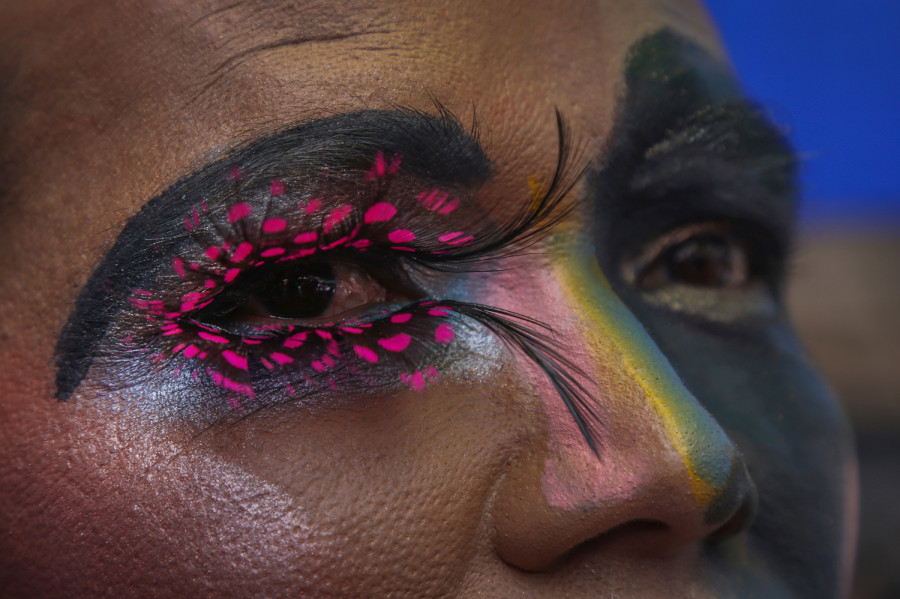National
Socially isolated and in financial despair, LGBTIQ individuals are taking their own lives
The lockdown has taken away livelihoods and forced queer individuals back in with prejudiced families, leading to social isolation and failing mental health.
Elisha Shrestha
On Sunday evening, Pinky Gurung received a text from her friend Narayani, who said she was depressed. Gurung immediately went to Narayani’s rented apartment in Sorakhutte where the two had a heartfelt conversation. Gurung thought that Narayani, a transwoman, was feeling much better. But the next day, when she was unable to reach Narayani on her mobile phone despite calling multiple times, Gurung sensed that something was wrong.
The body of 50-year-old Narayani was discovered by the police early Monday morning. Her death was ruled as suicide.
“Six months ago, Narayani had lost her daughter to suicide. Just when she was trying her best to cope with the grief, the lockdown took a toll on her mental and financial health,” said Gurung, who is president of the Blue Diamond Society, the country’s oldest LGBTIQ rights organisation.
According to Gurung, Narayani, a sex worker, had had no work since the beginning of the lockdown on March 24. She had told Gurung that she was experiencing extreme isolation and trauma because of social distancing measures put in place in response to the Covid-19 pandemic. She had decided against returning to her home in Dang because she was still closeted and feared being stigmatised.
“Narayani was a transgender woman with existing problems, isolated in a room without support. I think all these circumstances led her to take her own life,” said Gurung.
Various studies have shown that the LGBTIQ community is at higher risk of depression, anxiety, PTSD and suicide. These mental health problems are often triggered by a lack of family support, discrimination and prejudice. The Covid-19 and ensuing lockdown only made things worse—exacerbating social isolation and economic despair.
According to the Blue Diamond Society, four queer individuals have committed suicide during the lockdown, while as many as 20 people have reached out to Gurung personally via social media asking for help with their anxiety and depression.
There have also been reports of LGBTIQ individuals experiencing deteriorating mental health after being forced to isolate alongside family members who don’t accept their sexual orientation and gender identity.
“LGBTIQ individuals who haven’t come out may find it increasingly difficult to keep their gender identities and sexual orientations private in a lockdown,” said Dr Baikuntha Raj Adhikari, professor and head of the Department of Psychiatry at the Dharan-based BP Koirala Institute of Health Sciences. “Many have even been forced back into the closet just to be able to survive this pandemic, while for others, things can take a tragic path.”
Government and medical officers have been telling people that the home is the safest place to be to prevent contracting Covid-19 but according to Adhikari, for many of thousands of LGBTIQ individuals, home might be where prejudice, discrimination and abusive conditions lie.
On Saturday evening, Binesh Kumar Shah, who identifies as a transwoman, attempted suicide by drinking poison after her parents placed pressure on her to get married. She was found in a semi-conscious state and was rushed to the hospital by her brother-in-law.
“I have rented a room to live separately from my parents and I used to earn a living by dancing in weddings and ceremonies,” said 18-year-old Shah who has yet to come out to her family members. “However, due to the lockdown, I’ve found myself jobless. I didn’t have any option but to move back in with my family.”
At a time when she was still struggling to come in terms with her gender identity, taunts regarding her sexuality and constant pressure from her family to get married took a toll on her mental health, leading her to attempt suicide, she said.
“I felt suffocated trying to pretend who I was not. No one understands me except for my friends, with whom I can only communicate by text,” said Shah, who was discharged from hospital on Monday evening and is back at her parents’ home.
According to Bibek Susling Magar, programme officer at the Federation of Sexual and Gender Minorities Nepal, a transwoman in Parasi and a gay man in Dharan both took their own lives after suffering physical and verbal abuse from their parents with whom they were quarantining during the lockdown.
Although these incidents speak volumes about the need to address stigmatisation and its impact on the mental health of queer individuals, Magar said that mental health is still not openly discussed and there is a lack of resources for psychosocial counselling from organisations working for LGBTIQ rights.
“While everyone is aware of the need for psychosocial facilities to address mental health problems within the community, none of the organisations that work for LGBTIQs has hotlines or professional counsellors,” said Magar.
Even though there are different helplines for psychosocial counselling provided by organisations such as the Transcultural Psychosocial Organization, where anyone can seek help, both Magar and Gurung said that most people from the queer community are reluctant to talk about their mental health while others are unaware.
Magar is afraid that there must be many LGBTIQ individuals silently suffering from mental problems in the absence of social support.
“The lockdown has made us realise that the LGBTIQ community needs to invest in both creating mental health awareness and also creating a trusted platform where they can seek professional help without any fear,” he said.
The Tribhuvan University Teaching Hospital (TUTH) suicide hotline (9840021600) and the Patan Hospital crisis helpline for suicide prevention (9813476123) operate 24 hours.
The Transcultural Psychosocial Organization (16600102005) provides helpline services between Monday to Friday from 9:30 am to 4:30 pm.
BPKIHS Helpline: 9805316785, 9802331176 from 8:30 am to 5 pm everyday.




 16.16°C Kathmandu
16.16°C Kathmandu (1).jpg)













